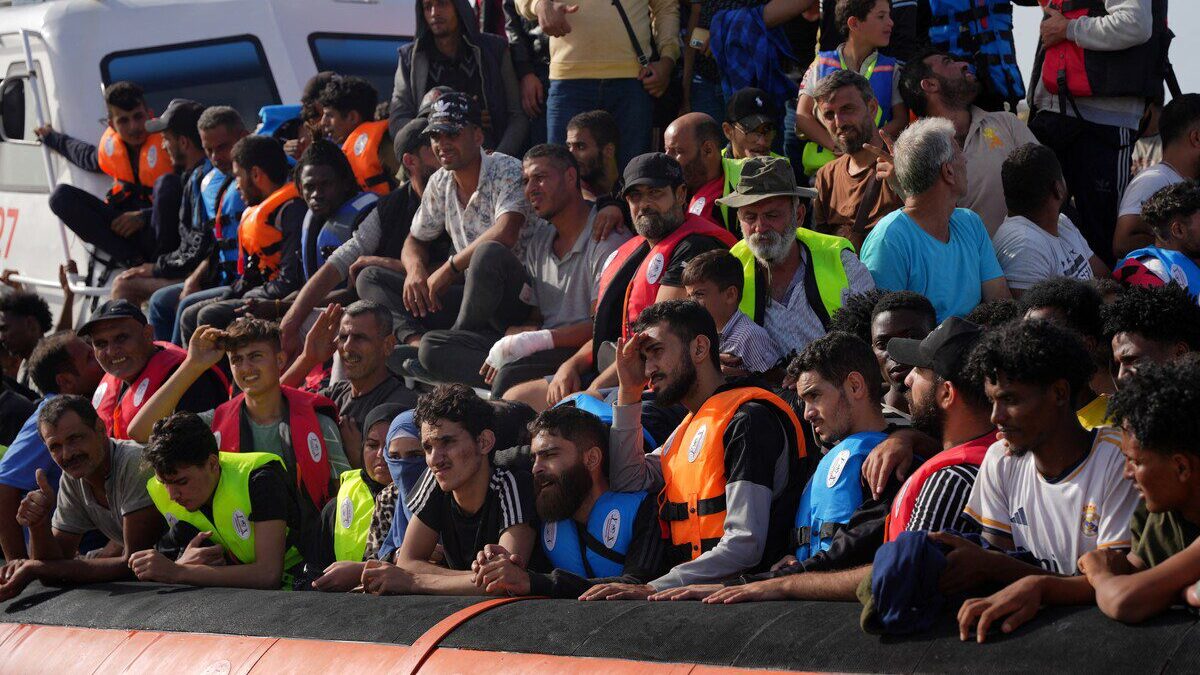
Migrants arrive in the harbor of the Italian island of Lampedusa, which in recent weeks has been swamped by new arrivals, September 18th, 2023.
Photo: ZAKARIA ABDELKAFI / AFP
Researchers commissioned by Oxfam to look into how the EU allocates its aid funds say the bloc does not abide by either its own or international rules concerning the correct use of funds.
In a report titled ‘From Development to Deterrence,’ published September 21st, the researchers conclude that of the bloc’s €80 billion aid fund, about 10% is earmarked for activities related to curbing migration.
International rules on ‘official development assistance’ (ODA) are set by the Paris-based Organisation for Economic Co-operation and Development (OECD).
Rules agreed on last December by the OECD’s Development Assistance Committee allow in-country refugee costs, as well as return and reintegration programs, to be classified as development aid.
While controversial, programs aimed at countering ‘irregular’ (illegal) migration, including border management and the fight against migrant smuggling and human trafficking, can also be included.
However, the OECD states that “activities that neglect the rights of forcibly displaced persons and migrants do not qualify as ODA.” The latter is what Oxfam protests.
For its commissioned study, which ran until May of this year, 16 of the EU’s migration-related projects (totalling some €1 billion) in Tunisia, Libya, and Niger were examined. Many migrants seeking entrance to the EU pass through those countries, and, as a result, they represent a vested interest for Brussels.
The researchers assessed that more than one-third of these projects were at risk of violating international aid rules, as stipulated by the OECD.
In Oxfam’s press release, the NGO complained that “more aid is directed towards activities that hinder migration and pose potential risks to people’s human rights rather than promoting safe and regular migration and economic growth through migration.”
Stephanie Pope, the organization’s EU migration expert, was quoted as saying:
European aid is being used as a tool to stop migration instead of what it is meant for: stopping poverty. The EU risks plundering its aid budget to build Fortress Europe while blackmailing non-EU countries into taking on Europe’s responsibilities when it comes to asylum and migration.
The report comes after last July’s deal between the EU and Tunisia. Partly designed to stem the flow of migrants coming to the EU via Tunisia, it has come under criticism due to Tunisia’s poor track record in respecting the human rights of the migrants that pass through there.
In the report, researchers stated funding had gone towards surveillance equipment and vessels for coast guards in Libya and Tunisia.
The issue of mass migration (legal or otherwise) and how best to tackle it notwithstanding, the report sheds light on the lack of transparency shown by the EU in how it spends taxpayers’ money.
Getting accurate figures is a complicated affair, the researchers say, since there is no record of which projects have received funding through the €80 billion EU aid fund.
The issue has not gone unnoticed by the European Parliament, which for over a year now—and in vain—has requested a record of which EU funds are going towards projects in Libya.
On this matter, Pope commented:
When it comes to migration, in many cases, we are in the dark about how EU taxpayer funds, meant to combat poverty, are actually being used. The lack of transparency is troubling, especially since we are halfway through the EU aid budget cycle. The European Parliament must be able to step in and ensure that every euro allocated for EU aid is spent in the right way.
She continued:
In the face of the EU failing to agree on how to manage migration within Europe, it is resorting to using aid to stop people from reaching Europe in the first place. Instead, the EU needs to create safe pathways for people to reach Europe and use aid for its proper purpose: ending poverty.
Responding to the report that same day, European Commission spokesperson Ana Pisonero said that “most of our actions are helping to address the root causes of migration.”
“Well managed migration is beneficial for partner countries and broadly speaking,” said Pisonero, and added that the EU respects OECD guidelines and that the EU’s own rules state that its aid aims to achieve “the reduction and, in the long term, the eradication of poverty.”
